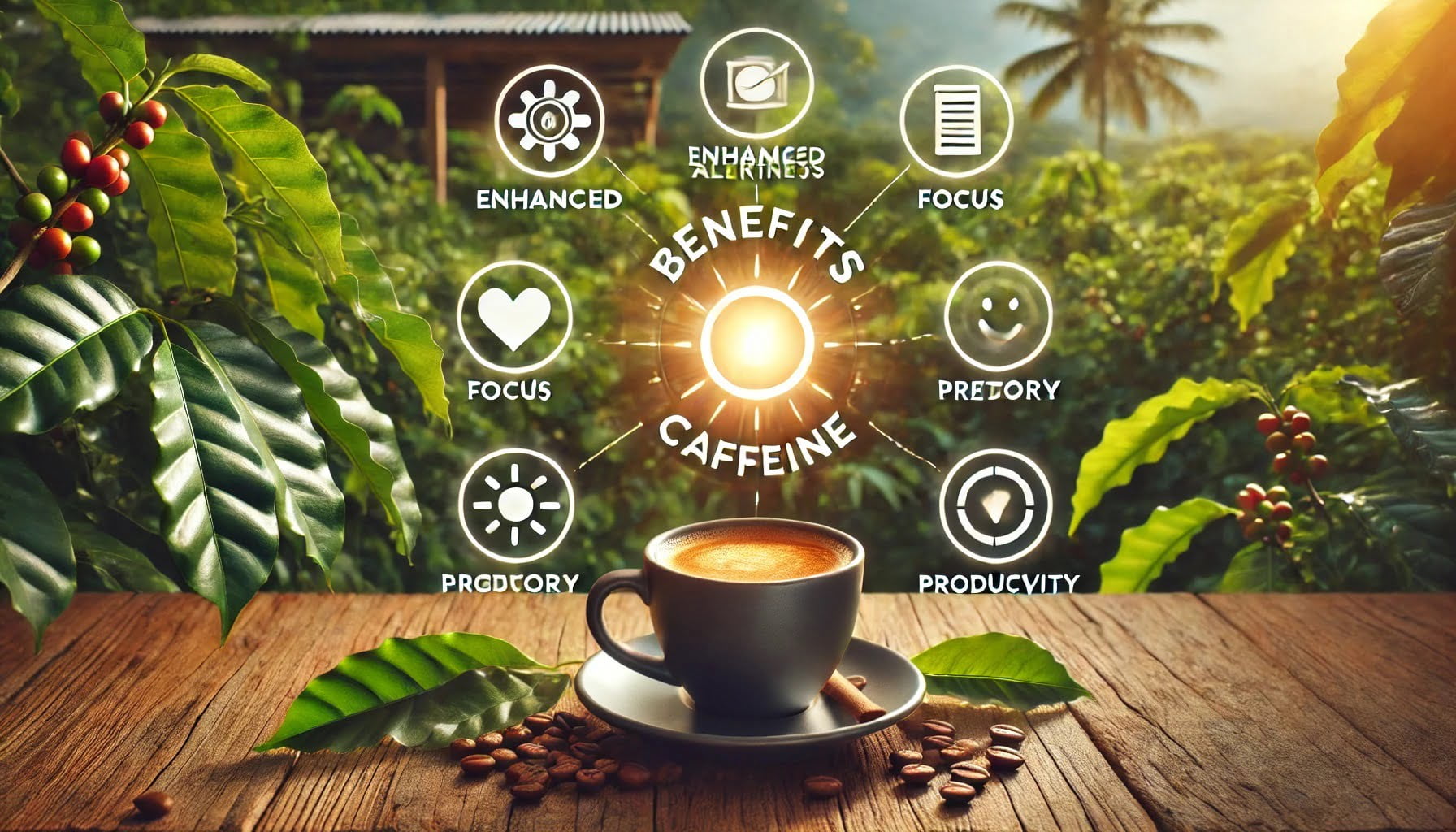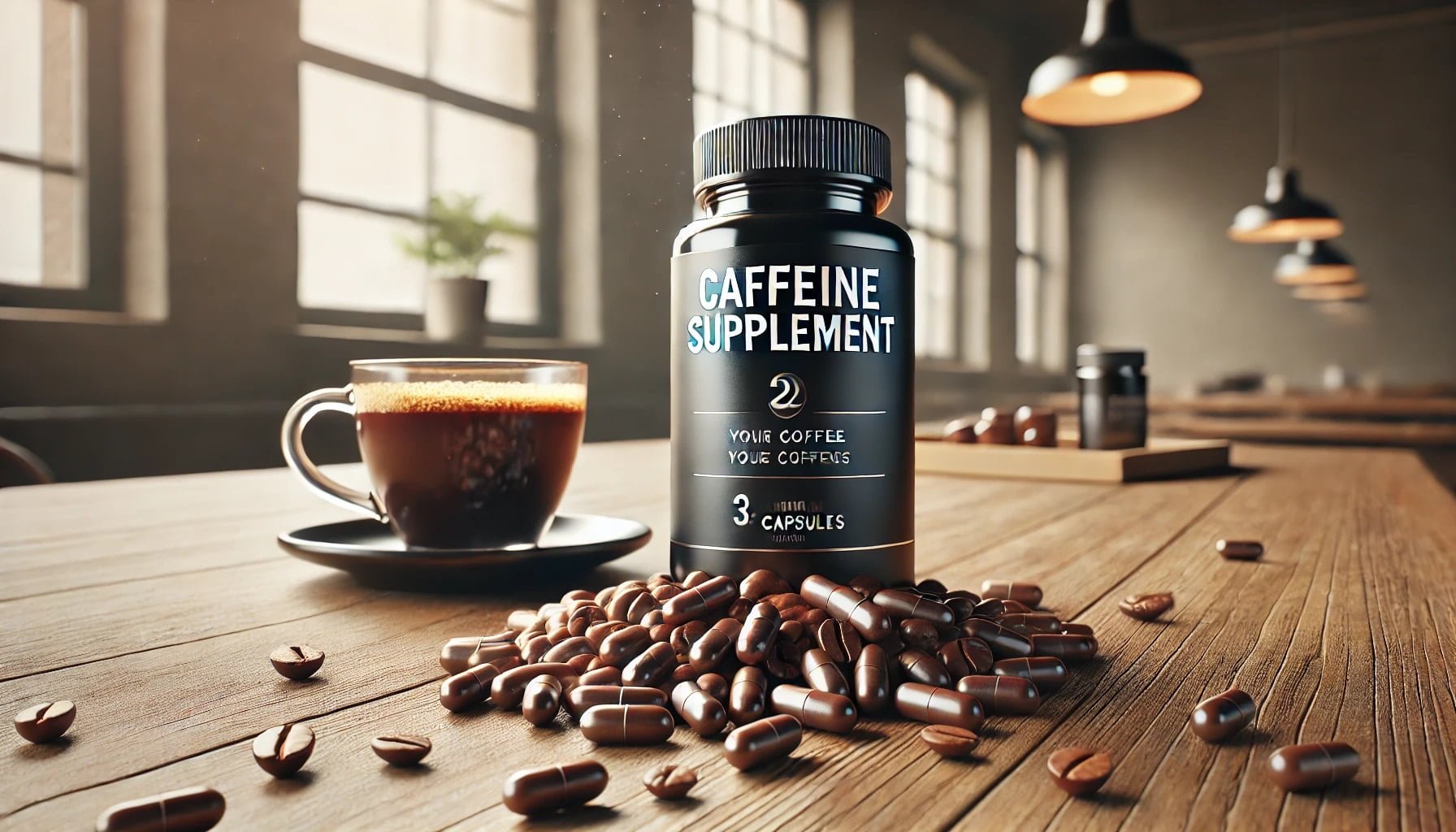
Caffeine, the widely consumed psychoactive alkaloid, acts as a powerful cognitive enhancer.
This article explores caffeine’s mechanisms, benefits, and potential risks. We’ll examine its effects on memory, focus, and mood, as well as its neuroprotective properties.
We’ll also discuss proper dosing, interactions with other nootropics, and potential side effects.
Whether you’re a student, athlete, or professional seeking a mental performance boost, understanding caffeine’s role in cognitive enhancement is crucial.
Table of Contents
What is Caffeine?
Caffeine is a psychoactive alkaloid, which acts as a stimulant in the human body, enhancing cognitive function and mental performance.
It’s chemically known as 1,3,7-trimethylxanthine and has a molecular formula C8H10N4O2.

Found in various plants, caffeine is commonly used to promote wakefulness, as a pre-workout for improved athletic performance, and in medication for pain relief.
Research shows that caffeine improves alertness, focus, and memory while offering neuroprotective benefits.
It also boosts physical performance and increase metabolism for weight loss.
Due to its potent effects, caffeine is suitable and recommended for:
- Athletes and fitness enthusiasts for enhancing physical performance
- Students and professionals needing to enhance focus and cognitive performance
- Shift workers requiring alertness during irregular hours
- People looking to enhance weight loss through boosted metabolism
What Are the Sources of Caffeine?
Caffeine is naturally present in over 60 plant species, with coffee beans, tea leaves, and kola nuts being the most common sources.
The caffeine content varies significantly among different foods and beverages:
| Source | Serving Size | Caffeine Content |
|---|---|---|
| Coffee | 8 oz (240 ml) | 95-200 mg |
| Black Tea | 8 oz (240 ml) | 14-70 mg |
| Green Tea | 8 oz (240 ml) | 24-45 mg |
| Dark Chocolate (Cocoa extract) | 1 oz (28 g) | 12 mg |
Besides the plant extracts, caffeine supplements come in various forms, each with its own characteristics and benefits:
- Caffeine Anhydrous: Highly concentrated, dehydrated form of caffeine, used in pre-workout supplements and energy drinks
- Caffeine Citrate: Combination of caffeine and citric acid, used to treat breathing problems in premature infants
- Caffeine Malate: Combines caffeine with malic acid, has less jitteriness compared to other forms
- Caffeine Sodium Benzoate: More water-soluble form of caffeine, used in some energy drinks
- Extended-Release Caffeine: Provides a steady release of caffeine over several hours, longer-lasting effects
How Does Caffeine Work in the Brain: What Is Its Mechanism of Action?
Caffeine influences the brain by blocking adenosine receptors, which are responsible for regulating excitation and inhibitions between nerve cells.
This is because caffeine’s molecular structure is like adenosine, allowing it to bind to adenosine receptors.
However, unlike adenosine, caffeine doesn’t activate these receptors. Instead, it blocks them, preventing adenosine from binding and exerting its sleep-promoting effects.
This blockade of adenosine receptors triggers downstream effects, including increased neurotransmitter release and increased metabolic rate.
Caffeine’s adenosine activity leads to combined effects on other neurotransmitter systems:
- Dopamine: Blocks adenosine A2A receptors indirectly enhancing dopamine signaling
- Norepinephrine: Releases norepinephrine which increases alertness and arousal
- Acetylcholine: Enhance acetylcholine release in certain brain regions
- Serotonin: Less pronounced effects
- GABA: Stimulates GABA receptors
Another significant effect of caffeine is that it spikes metabolic rates and energy levels in the brain.
This contributes to caffeine’s ability to boost physical performance and combat fatigue.
What Are The Nootropic Benefits of Caffeine?
Caffeine offers a wide range of nootropic benefits, making it one of the most popular mental enhancers worldwide.
Its effects are well-documented on various aspects of cognition, like:
- Alertness and vigilance
- Focus and concentration
- Short-term memory recall
- Motivation and productivity
- Mood and fatigue

How Does Caffeine Enhance Memory and Learning?
Caffeine enhances memory and learning through modulating neurotransmitter systems and improving brain metabolism.
Caffeine improves working memory, by nudging dopamine into action, particularly in situations of fatigue or sleep deprivation.
A study used functional MRI to demonstrate that caffeine increased dopamine levels in the brain regions associated with working memory and attention.(1)
Caffeine can also enhance the consolidation of long-term memories, due to increased acetylcholine release in the hippocampus.
A study found that 200 mg of caffeine administered after a learning task improved memory recall 24 hours later.(2)
Caffeine has also been linked to improving spatial memory and visual learning capacity, by enhanced dopamine signaling.
Research on learning performance, among school-age children, showed that caffeine enhanced spatial learning in anxiety inducing tasks at school.(3)
Can Caffeine Improve Focus and Alertness?
Yes. Caffeine improves focus and alertness through its effects on adenosine receptor.
Caffeine significantly improves vigilance by raising norepinephrine levels, particularly during tasks requiring sustained attention.
A meta-analysis found that caffeine consistently enhanced vigilance across various studies, with effects noticeable even at low doses (32-50 mg).(4)
In situations of fatigue or sleep deprivation, caffeine signals dopamine and norepinephrine into action.
Research found that even low doses of caffeine (12.5 to 100 mg) could significantly improve alertness and reduce fatigue.(5)
A study by found that caffeine reduced task-unrelated thoughts during a reading task, leading to improved comprehension.(6)
A study by found that caffeine reduced task-unrelated thoughts during a reading task, leading to improved comprehension.(7)
What is the Impact of Caffeine on Mood and Mental Health?
Caffeine mitigates body’s stress, anxiety, and depressive cycles, which have a broader effect on mood and mental health.
Caffeine improves mood by stimulating dopamine signals which motivates and inspires action.
A study found that 75 mg of caffeine improved mood and reduced fatigue due to registered dopamine spike, in both habitual and non-habitual consumers.(8)
Long-term caffeine consumption also correlates with a lower risk of anxiety and depression.
A meta-analysis found that coffee consumption, by exhibiting serotonin levels, decreased risk of depression, with the strongest effect at 400 ml/day.(9)
Does Caffeine Offer Neuroprotective Benefits?
Caffeine does offer neuroprotective benefits, as evidenced by a growing body of research.
Long-term caffeine consumption lowers the risk of developing neurodegenerative diseases.
Caffeine’s antagonism of adenosine A2A receptors leads to neuroprotective effects. This includes reducing neuroinflammation and oxidative stress, both of which are involved in the pathogenesis of Parkinson’s and Alzheimer’s disease.
A review found that moderate coffee consumption reduces the risk of Alzheimer’s disease by 25-30%.(10)
Caffeine and its metabolites have antioxidant properties that protect neurons from oxidative stress.
A study demonstrated that caffeine could protect against oxidative stress-induced neurotoxicity in cultured neurons.(11)
Caffeine’s anti-inflammatory effects counteract chronic inflammation associated with neurodegenerative processes.
A study confirms this relationship by showing the control of adenosine receptors induces anti-inflammatory effects in the brain’s blood vessels.(12)
How to Use Caffeine for Cognitive Enhancement?
For cognitive enhancement, caffeine must be used in moderation. It can enhance performance when used strategically, sometimes in combination with other nootropic substances. Results are usually noticeable within minutes.

What are the Recommended Dosages of Caffeine?
The recommended dosages of caffeine for cognitive enhancement vary depending on individual factors such as body weight, caffeine tolerance, and sensitivity.
However, general guidelines based on scientific research can be helpful:
| Dose | Comparable Quantity | Effects |
|---|---|---|
| Low: 50-100 mg | 1 small cup of coffee or 1-2 cups of tea | Mild increase in alertness and concentration |
| Moderate: 100-200 mg | 1 regular cup of coffee or 2-3 cups of tea | Improved alertness, attention, and cognitive function |
| High: 200-400 mg | 2-4 cups of coffee | Significant improvements in alertness and cognitive performance, but increased risk of side effects |
| Very High: >400 mg | Not recommended for most individuals | Potential for enhanced performance, but high risk of adverse effects |
How Quickly Can You Expect to See Results from Caffeine Supplementation?
The onset of caffeine’s effects is relatively rapid, with noticeable changes in alertness and mood occurring within minutes of consumption.
Simply out, the timeline of caffeine’s effects may look like this:
| Immediate Effects | Elevated alertness, better mood, lower fatigue | 30-60 minutes |
| Duration of Efficacy | Sustained cognitive performance | 4-6 hours |
| Long-term Effects | Resistance to neurodegeneration, protection against cognitive decline | Years of consistent use |
Is Caffeine Safe to Take with Other Nootropic Supplements?
Caffeine can be safely combined with many nootropic supplements, but it’s crucial to understand potential interactions and exercise caution.
Here’s an overview of caffeine’s compatibility with other common nootropics:
- L-Theanine: Improves cognitive performance and mood more effectively than caffeine alone
- Racetams (e.g., Piracetam, Aniracetam): Enhances focus
- Adaptogens (e.g., Rhodiola Rosea, Ashwagandha): Reduces fatigue and improve mental performance
- Choline Supplements: Improves attention and working memory
- Modafinil: Overstimulates and increases side effects. Caution is advised when mixing!
- MAO Inhibitors: Dangerous increases in blood pressure – avoid it!
- Amphetamines or Other Stimulants: Increases the risk of side effects
- Omega-3 Fatty Acids: Improves cognitive performance in older adults
Who Should Avoid Taking Caffeine?
Certain individuals or groups may need to avoid or limit their caffeine intake due to its potential effects on health.
Here are some of those groups:
- Pregnant/Breastfeeding Women: Risk of miscarriage, low birth weight
- Anxiety Disorders: Worsens symptoms
- Sleep Disorders: Interferes with sleep
- Heart Conditions: Increases heart rate and blood pressure
- Children/Adolescents: Affects sleep and development
- GERD: Worsens heartburn
- Migraines/Headaches: Can trigger or worsen symptoms
- Osteoporosis: Affects calcium absorption and bone health
What are the Potential Side Effects of Caffeine?
Caffeine consumption can lead to a range of side effects, which vary in intensity and occurrence depending on factors such as dosage, individual tolerance, and genetic predisposition.
Here are the most common side effects associated with caffeine intake:
- Insomnia and sleep disturbances
- Anxiety and nervousness
- Digestive issues
- Increased heart rate and blood pressure
- Headaches
- Mood swings
- Frequent urination
- Ringing in the ears (Tinnitus)
- Eye twitching
- Reduced insulin sensitivity
What Are the Signs and Symptoms of Caffeine Addiction?
Caffeine addiction, also known as caffeine dependence syndrome, is characterized by regular, excessive caffeine consumption.
Some withdrawal symptoms include:
- Headaches
- Fatigue
- Irritability
- Difficulty concentrating
- Depressed mood
Are There Any Long-term Risks Associated with High Caffeine Intake?
High and prolonged caffeine intake may be associated with certain risks.
Here are some potential long-term risks associated with high caffeine intake:
- Chronic elevated blood pressure
- Reduced bone density
- Increased risk of gastroesophageal reflux disease (GERD), risk of ulcers
- Chronic sleep disturbances
- Low birth weight if consumed during pregnancy
- Increased risk of urinary incontinence
- Risk for tooth enamel erosion
Important Note: Some of these effects stem from the fact that caffeine attenuates our body’s ability to absorb and metabolize calcium.
Does Caffeine Interact with Medication?
Yes, caffeine can interact with several medications. Here is a brief list of some medications and the potential effects of these interactions:
- Antibiotics (Ciprofloxacin, Norfloxacin): Leading to heightened side effects (e.g., jitteriness, headache).
- Antidepressants (MAOIs, such as Phenelzine, Tranylcypromine): Increased risk of high blood pressure and other cardiovascular effects.
- Blood Thinners (Warfarin): Potential interference with blood clotting, altering the effectiveness of the medication.
- Asthma Medications (Theophylline): Increased side effects (e.g., nausea, vomiting, heart palpitations).
- Antipsychotics (Clozapine): Elevated blood levels of the medication, increasing the risk of toxicity and side effects.
- Antiarrhythmics (Quinidine): Elevated caffeine levels, increasing the risk of side effects.
- Oral Contraceptives: Slowed metabolism of caffeine, prolonging its effects and increasing side effects.
- Koppelstaetter, Florian, et al. “Does caffeine modulate verbal working memory processes? An fMRI study.” Neuroimage 39.1 (2008): 492-499.↩
- Borota, Daniel, et al. “Post-study caffeine administration enhances memory consolidation in humans.” Nature neuroscience 17.2 (2014): 201-203.↩
- Bernstein, Gail A., et al. “Caffeine effects on learning, performance, and anxiety in normal school-age children.” Journal of the American Academy of Child & Adolescent Psychiatry 33.3 (1994): 407-415.↩
- Einöther, Suzanne JL, and Timo Giesbrecht. “Caffeine as an attention enhancer: reviewing existing assumptions.” Psychopharmacology 225 (2013): 251-274.↩
- Smith, Andrew P. “Caffeine at work.” Human Psychopharmacology: Clinical and Experimental 20.6 (2005): 441-445.↩
- O’callaghan, Frances, Olav Muurlink, and Natasha Reid. “Effects of caffeine on sleep quality and daytime functioning.” Risk management and healthcare policy (2018): 263-271.↩
- Kuchinke, Lars, and Vanessa Lux. “Caffeine improves left hemisphere processing of positive words.” PLoS One 7.11 (2012): e48487.↩
- Kennedy, David O., and Crystal F. Haskell. “Cerebral blood flow and behavioural effects of caffeine in habitual and non-habitual consumers of caffeine: a near infrared spectroscopy study.” Biological psychology 86.3 (2011): 298-306.↩
- Wang, Longfei, et al. “Coffee and caffeine consumption and depression: A meta-analysis of observational studies.” Australian & New Zealand Journal of Psychiatry 50.3 (2016): 228-242.↩
- Wierzejska, Regina. “Can coffee consumption lower the risk of Alzheimer’s disease and Parkinson’s disease? A literature review.” Archives of Medical Science 13.3 (2017): 507-514.↩
- Chu, Yi-Fang, et al. “Bioactivities of crude caffeine: Antioxidant activity, cyclooxygenase-2 inhibition, and enhanced glucose uptake.” Food Chemistry 131.2 (2012): 564-568.↩
- Eichwald, Tuany, et al. “Anti-inflammatory effect of caffeine on muscle under lipopolysaccharide-induced inflammation.” Antioxidants 12.3 (2023): 554.↩
